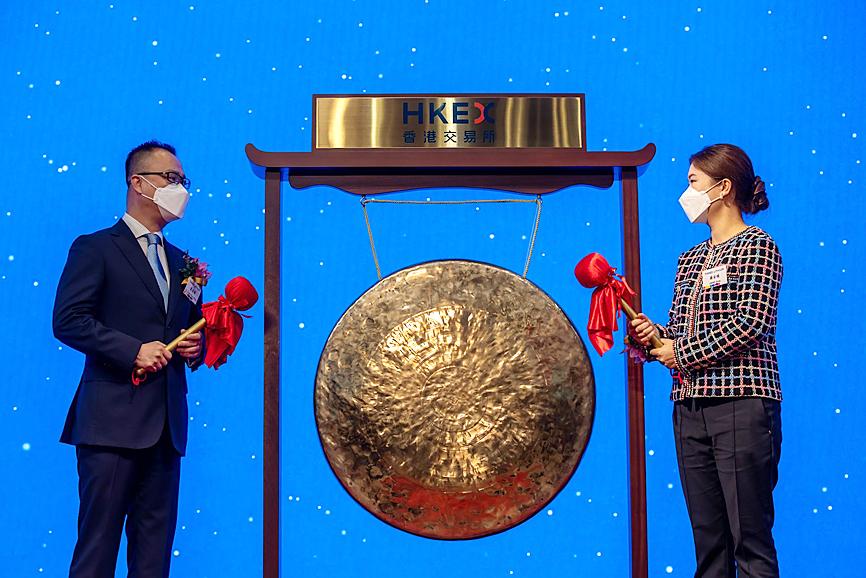Tianqi Lithium Corp (天齊鋰業) fell as much as 11 percent in Hong Kong, following the largest share sale in the territory this year.
Its shares dropped to as low as HK$72.65 in early trading yesterday, before trimming losses.
The supplier of the key material used in batteries, already listed in China’s Shenzhen, sold the stock at HK$82 apiece in a secondary listing in Hong Kong. That was the top of a marketed range in an offering that raised about HK$13.5 billion (US$1.7 billion).

Photo: Bloomberg
The slump suggests investors remain wary of putting money into newly listed stocks in Hong Kong. Three other companies that debuted in the territory yesterday also dropped. The negative start casts a shadow over a pipeline of large offerings in the territory, including that of China Tourism Group Duty Free Corp (中國旅遊集團中免), the world’s largest travel retailer, which is planning a share sale of as much as US$3 billion.
However, Tianqi’s Hong Kong listing caps a major turnaround for the firm after a debt crisis just two years ago forced it to sell stakes in prize assets, and raised questions for management.
The company’s revival was aided by an eye-popping gain of more than 1,000 percent for lithium prices since the middle of 2020.
Tianqi mines lithium in Australia, and produces compounds and derivatives in China. The Chinese producer first brought up a secondary listing in 2018, but shelved the plan amid falling lithium prices and liquidity problems. In 2020, the company sold a stake in Australia’s Greenbushes, one of the world’s most coveted lithium mines, to Perth-based IGO Ltd for US$1.4 billion to help repay debt.
A fresh global push for electrified transport is fueling a demand boom for lithium — a key material used in electric vehicle batteries.
BloombergNEF data showed that lithium prices could stay elevated amid a tight market this year.
Tianqi is planning to more than double its lithium refining capacity in the next three years to about 99,790 tonnes, from about 45,000 tonnes, chief executive officer Frank Ha (夏浚誠) said in an interview with Bloomberg Television yesterday.
“The continued ramp-up of revenues and prices is something that we can foresee,” Ha said.
Most companies that debuted in Hong Kong this year fell on their first day of trade, data compiled by Bloomberg showed.
Retailer Miniso Group Holding Ltd (名創優品), wealth management company Noah Holdings Ltd (諾亞控股) and piped natural gas distributor Huzhou Gas Co (湖州燃氣) slumped as much as 4.9 percent, 7.3 percent and 9.5 percent respectively on their first day of trading yesterday.
Big offerings have dwindled this year amid rising inflation, hawkish central banks and a jump in volatility that has led the Hang Seng Index to retreat more than 10 percent.
Strong appetite for listings in the territory has yet to return, DZT Research head of research Ke Yan said.
“Everyone is still working hard to find [a] deal to profit from,” he said.

Intel Corp chief executive officer Lip-Bu Tan (陳立武) is expected to meet with Taiwanese suppliers next month in conjunction with the opening of the Computex Taipei trade show, supply chain sources said on Monday. The visit, the first for Tan to Taiwan since assuming his new post last month, would be aimed at enhancing Intel’s ties with suppliers in Taiwan as he attempts to help turn around the struggling US chipmaker, the sources said. Tan is to hold a banquet to celebrate Intel’s 40-year presence in Taiwan before Computex opens on May 20 and invite dozens of Taiwanese suppliers to exchange views

Application-specific integrated circuit designer Faraday Technology Corp (智原) yesterday said that although revenue this quarter would decline 30 percent from last quarter, it retained its full-year forecast of revenue growth of 100 percent. The company attributed the quarterly drop to a slowdown in customers’ production of chips using Faraday’s advanced packaging technology. The company is still confident about its revenue growth this year, given its strong “design-win” — or the projects it won to help customers design their chips, Faraday president Steve Wang (王國雍) told an online earnings conference. “The design-win this year is better than we expected. We believe we will win

Power supply and electronic components maker Delta Electronics Inc (台達電) yesterday said it plans to ship its new 1 megawatt charging systems for electric trucks and buses in the first half of next year at the earliest. The new charging piles, which deliver up to 1 megawatt of charging power, are designed for heavy-duty electric vehicles, and support a maximum current of 1,500 amperes and output of 1,250 volts, Delta said in a news release. “If everything goes smoothly, we could begin shipping those new charging systems as early as in the first half of next year,” a company official said. The new

Quanta Computer Inc (廣達) chairman Barry Lam (林百里) is expected to share his views about the artificial intelligence (AI) industry’s prospects during his speech at the company’s 37th anniversary ceremony, as AI servers have become a new growth engine for the equipment manufacturing service provider. Lam’s speech is much anticipated, as Quanta has risen as one of the world’s major AI server suppliers. The company reported a 30 percent year-on-year growth in consolidated revenue to NT$1.41 trillion (US$43.35 billion) last year, thanks to fast-growing demand for servers, especially those with AI capabilities. The company told investors in November last year that